#medical gender bias
Text
While I have been on Tumblr for at least a decade as a nerd girl/nerdfighter I haven't been sharing what's been going on with me in a larger sense. I'm not sure if I'll connect up my personal Tumblr with this(so it won't look like I have followed you back but I probably have), I'll have to have a think about that as my personal Tumblr has been an oasis as I've been fighting to stay alive against ridiculous and seeming unsurmountable odds. I sum it up here in a article I wrote for the disability Alliance of British Columbia last fall
https://disabilityalliancebc.org/article-im-fighting-to-live-but/
Full story in the I am Madeline podcast
https://anchor.fm/i-am-madeline
As I did in the Twitter account in their pinned tweet I will include all of the media articles that have been done so far as well as the Reddit thread that included much kindness and a lot of stuff that made me want to bang my head against a wall. Also some articles about post viral syndrome and me particularly long covid as those are the new additions to the post viral syndrome community. I don't have a lot of energy probably because of my disease but because of the dyslexia textual communication can be quite difficult for me so I'm not going to try to edit the file that I kept the media links and the general medical articles and. So I hope you can make sense of it and that all of the links still work.
I think / hope that I should be able to pin this to the top of this tumblr
In no particular order here is the link dump
Gfm
https://gofund.me/cff39173
https://www.gofundme.com/f/MadelinesMiracle?utm_medium=copy_link&utm_source=customer&utm_campaign=p_lico+share-sheet
Citr ep April 6 2023
https://www.citr.ca/radio/all-access-pass/episode/20230406/
Petition
https://www.meaction.net/2022/03/01/you-can-still-help-madeline/
https://dir.gov.bc.ca/gtds.cgi?show=Branch&organizationCode=HLTH&organizationalUnitCode=MH
Dabc Nov 2022
Blog
https://disabilityalliancebc.org/article-im-fighting-to-live-but/
Pdf mag
https://disabilityalliancebc.org/transitionfallwinter22/
Tyee November 14 2022
https://thetyee.ca/News/2022/11/14/Chronically-Ill-Dying-Poverty/
Chatelaine
https://www.chatelaine.com/health/maid-assisted-death-poverty/
Podcast
https://anchor.fm/i-am-madeline/episodes/Ep--1---How-do-you-solve-a-problem-e110jks
https://anchor.fm/i-am-madeline
(https://www.iammadeline.com/)
City tv news Hana Mae change of by-line
https://vancouver.citynews.ca/2020/07/27/vancouver-woman-disabilities-medically-assisted-dying/
Media
News 11:30
https://www.citynews1130.com/2020/07/27/vancouver-woman-disabilities-medically-assisted-dying/
https://www.citynews1130.com/2020/11/24/vancouver-woman-me-covid-19/
Tyee article
https://thetyee.ca/News/2021/07/05/I-Should-Not-Have-To-Beg-For-My-Life/
Canada land podcast
https://www.canadaland.com/madeline-medical-assistance-in-dying-priced-out-of-life/
https://www.canadaland.com/podcast/723-the-high-cost-of-living/
Update
https://www.canadaland.com/podcast/741-updates-on-pretendians-porn-and-being-priced-out-of-life/
Millions missing simulcast
https://twitter.com/millionspod/status/1450838974864445440?t=tiE3pZtRLB9LiRVXIg4u8g&s=19
My Op-ed
https://quoimedia.com/canadians-with-disabilities-like-me-are-choosing-to-die-because-we-dont-have-the-financial-resources-to-live/
https://ipolitics.ca/2021/11/15/the-disabled-are-choosing-to-die-because-they-cant-afford-to-live/
Reddit post about op-ed
https://www.reddit.com/r/onguardforthee/comments/qul8c3/the_disabled_are_choosing_to_die_because_they/
are live on QUOI Media’s website.
https://quoimedia.com/canadians-with-disabilities-like-me-are-choosing-to-die-because-we-dont-have-the-financial-resources-to-live/
https://quoimedia.com/des-canadiennes-et-canadiens-en-situation-de-handicap-comme-moi-choisissent-de-mourir-parce-quils-nont-pas-les-moyens-de-vivre/
INFO
Gender bias in research
https://pubmed.ncbi.nlm.nih.gov/33232627/
Costs two to three times more to be disabled
https://pubmed.ncbi.nlm.nih.gov/31026771/ https://pubmed.ncbi.nlm.nih.gov/31026771/
Mayo
https://www.mayoclinicproceedings.org/article/S0025-6196(21)00513-9/fulltext
Bateman Horne PDF
https://twitter.com/BatemanHorne/status/1462907081686540290?t=MzYkyjZ_-QYAH4_td5zUFA&s=19
NICE COMM
https://www.nice.org.uk/news/article/nice-me-cfs-guideline-outlines-steps-for-better-diagnosis-and-management
Twitter link to various ME studies
https://twitter.com/CPrudhommeAQEM/status/1500854349442002951?t=U-DZG-DLNUqYVkz-Ygoewg&s=19
Pdf of studies
https://www.me-international.org/published-me-icc-studies.html
CDC
https://www.cdc.gov/me-cfs/healthcare-providers/presentation-clinical-course/etiology-pathophysiology.html
Disprove cbt
https://journals.sagepub.com/doi/full/10.1177/2055102919838907
Blog reply to above
https://blogs.bmj.com/medical-humanities/2021/03/23/the-concept-of-illness-without-disease-impedes-understanding-of-chronic-fatigue-syndrome-a-response-to-sharpe-and-greco/
Physio
https://www.physio-pedia.com/Myalgic_Encephalomyelitis_or_Chronic_Fatigue_Syndrome
Me from covid
https://meassociation.org.uk/2020/05/me-awareness-columbia-university-will-there-be-a-post-covid-19-form-of-me-cfs-26-may-2020/
Australia me study small town
https://www.bmj.com/content/333/7568/575
Percentage of doctors you understand me
https://doctorswith.me/poor-knowledge-of-me-cfs-among-doctors-puts-patients-at-risk-of-harm/
https://doctorswith.me/poor-knowledge-of-me-cfs-among-doctors-puts-patients-at-risk-of-harm/
https://www.hsph.harvard.edu/news/press-releases/epstein-barr-virus-may-be-leading-cause-of-multiple-sclerosis/
https://pubmed.ncbi.nlm.nih.gov/33232627/ gender disparity in research money and allocation by NIH
https://onlinelibrary.wiley.com/doi/full/10.1111/1753-6405.13139
Wiley Online Library
Australian and New Zealand Journal of Public Health
Volume 45, Issue 5 p. 424-426
Commentary
Open Access
Sex and gender gaps in medicine and the androcentric history of medical research
Lea Merone, Komla Tsey, Darren Russell, Cate Nagle
First published: 28 June 2021
Interrelationship between myalgic encephalomyelitis and long covid
https://www.science.org/doi/10.1126/science.abo1261?utm_campaign=SciMag&utm_source=Social&utm_medium=Twitter
Brain fog https://www.theatlantic.com/health/archive/2022/09/long-covid-brain-fog-symptom-executive-function/671393/
https://www.theatlantic.com/health/archive/2022/09/mecfs-chronic-fatigue-syndrome-doctors-long-covid/671518/
Forbes
https://www.forbes.com/sites/roberthart/2021/07/15/long-covid-has-over-200-symptoms-and-leaves-1-in-5-unable-to-work-study-finds/?sh=1f11766e5eb2
herpes simplex including Epstein-Barr latency and damage to genome tissue study sample including autopsies
https://www.frontiersin.org/articles/10.3389/fmolb.2022.1044964/abstract
https://twitter.com/loscharlos/status/1612196453258256384?t=C1UGoqR72JjmBeVRreJ41A&s=09
What #LongCovid continues to experience is a social medical phenomena know as the **Semmelweis Reflex** —
“the metaphor for the reflex-like tendency to reject new evidence or new knowledge because it contradicts established norms, beliefs, or paradigms.” 🧵
I was introduced to this term while reading @meghanor excellent, essential book “Invisible Kingdom”
As she shared, it was named after the doctor who said physicians assisting with childbirth should wash their hands to reduce maternal mortality & was exiled from the profession
https://www.scientificamerican.com/article/a-tsunami-of-disability-is-coming-as-a-result-of-lsquo-long-covid-rsquo/
https://fortune.com/well/2023/05/23/covid-deaths-one-person-every-four-minutes-vaccination-rates/
Protect BC
https://protectbc.ca/public-healt-scandal-failure-to-warn/
#nerdfighter#nerdfighting#podcast#disability#disability pride#myalgic encephalomyelitis#post viral#post viral disease#Epstein-Barr#human rights#gender bias#medical gender bias#maid#Canada#Canadian#British Columbia#meaction#pwme#myalgicE#fibromyalgia#immune deficiency#autoimmune disorders#mast cell activation disorder#multiple chemical sensitivities#hypermobility#hypermobility syndrome#heds#h-eds#pain#disability assistance
2 notes
·
View notes
Text
saw that there was a video on tiktok circulating about what people even do with womens studies degrees and I saw a nice little rebuttal video that gave a syllabus list and that’s really nice and informative and all but back to the point there are real jobs that are super important that people can do with humanities degrees and part of fighting the backlash against them is acknowledging they exist
#I mean in a capitalist sense sociology psychology etc are super useful when you’re trying to sell people shit#but like a good chunk of women’s studies is devoted to the political and medical sphere#everything from setting up workplace policies (yes HR more legal)#to studying pay disparities#examining bias in clinical studies#plus there’s the whole research field of doing studies into gender#and the combination of medicine and law like studying anti choice laws etc etc#there are people who do all this shit for a living and it’s all legitimate work
11 notes
·
View notes
Text
Autism Acceptance Month Fact #8
If you’re trans, you might have to choose between an autism diagnosis and gender-affirming surgery.
It’s much much harder (and in some cases impossible) to be approved for gender-affirming surgery if you’re diagnosed as autistic.
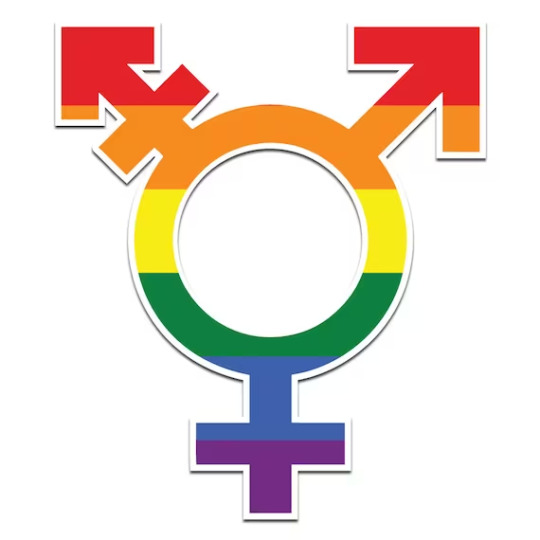
#autism acceptance#did you know#random fact#random facts#little known fact#random factoids#random factoid#yes really#autism#neurodiversity#neurodivergent#autistic#autistic things#transgender#medical bias#gender affirming care#asd#actuallyautistic#sad but true
3 notes
·
View notes
Text
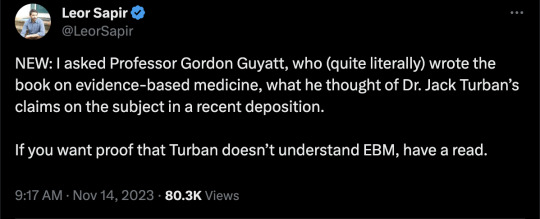
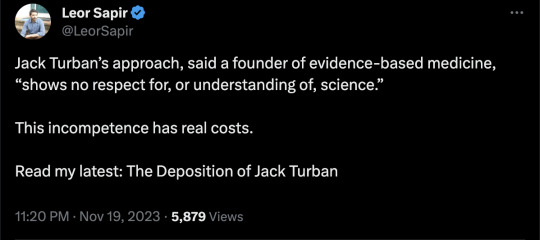
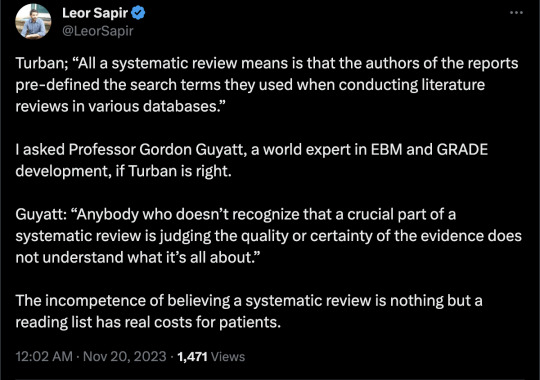
By: Leor Sapir
Published: Nov 13, 2023
Few figures in the medical world generate more controversy than psychiatrist Jack Turban. An assistant professor of child and adolescent psychiatry at the University of California, San Francisco, Turban is one of the leading figures promoting “gender-affirming care” in the United States. He is also regularly criticized for producing deeply flawed research and denying the significant rollback of youth gender transition in Europe.
The American Civil Liberties Union recently retained Turban as an expert witness—paying him $400 per hour—in its legal challenge to Idaho’s Vulnerable Child Protection Act, which restricts access to “gender-affirming” drugs and surgeries to adults only. On October 16, Turban submitted to a seven-hour deposition at the hands of John Ramer, an attorney with the law firm Cooper & Kirk, who is assisting Idaho in the litigation. In the course of the deposition, Turban revealed that, aside from churning out subpar research and misleading the public about scientific findings, he also appears not to grasp basic principles of evidence-based medicine.
Evidence-based medicine (EBM) refers to “the conscientious, explicit, and judicious use of current best evidence in making decisions about the care of individual patients. . . . The practice of evidence-based medicine means integrating individual clinical expertise with the best available external clinical evidence from systematic research.” Because the expert opinion of doctors, even when guided by clinical experience, is vulnerable to bias, EBM “de-emphasizes intuition, unsystematic clinical experience, and pathophysiologic rationale as sufficient grounds for clinical decision making and stresses the examination of evidence from clinical research.” EBM thus represents an effort to make the practice of medicine more scientific, with the expectation that this will lead to better patient outcomes.
Systematic reviews and meta-analyses sit at the top of the hierarchy of evidence in EBM. A key difference between the U.S. and European approaches to pediatric gender medicine is that European countries have changed their clinical guidelines in response to findings from systematic reviews. In the U.S., medical groups have either claimed that a systematic review “is not possible” (the World Professional Association for Transgender Health), relied on systematic reviews but only for narrowly defined health risks and not for benefits (the Endocrine Society), or used less scientifically rigorous “narrative reviews” (the American Academy of Pediatrics). One of the world’s leading experts on EBM has called U.S. medical groups’ treatment recommendations “untrustworthy.”
In the deposition, Ramer asked Turban to explain what systematic reviews are. “[A]ll a systematic review means,” Turban responded, “is that the authors of the reports pre-defined the search terms they used when conducting literature reviews in various databases.” The “primary advantage” of a systematic review, he emphasized, is to function as a sort of reading list for experts in a clinician field. “Generally, if you are in a specific field where you know most of the research papers, the thing that’s most interesting about systematic review is if it identifies a paper that you didn’t already know about.” Ramer showed Turban the EBM pyramid of evidence, which appears in the Cass Review (page 62) of the U.K.’s Gender Identity Development Service. He asked Turban why systematic reviews sit at the top of the pyramid. Turban responded: “Because you’re looking at all of the studies instead of looking at just one.”
Turban’s characterization represents a fundamental misunderstanding of what EBM is and why systematic reviews are the bedrock of trustworthy medical guidelines.
First, even if the only thing that makes a review systematic is that it “pre-defines the search terms,” Turban failed to explain the relevance of this. A major reason systematic reviews rank higher than narrative reviews in EBM’s information hierarchy is that systematic reviews follow a transparent, reproducible methodology. Anyone who applies the same methodology and search criteria to the same body of research should arrive at the same set of conclusions. Narrative reviews don’t use transparent, reproducible methodologies. Their conclusions are consequently more likely to be shaped by the personal biases of their authors, who may, for instance, cherry-pick studies.
To achieve transparency and reproducibility, systematic reviews define in advance the populations, interventions, comparisons, and outcomes of interest (PICO). They search for and filter the available literature with Preferred Reporting Items for Systematic Reviews and Meta-Analyses. Authors register their methodology and search criteria in advance in databases such as PROSPERO. These steps are meant to minimize the risk that authors will change their methodology midway through the process in response to inconvenient findings.
Turban acknowledged that pre-defining the search terms “makes it a little bit easier for another researcher to repeat their search.” However, he did not seem to grasp that the additional steps introduced by systematic reviews are designed to reduce bias and improve accuracy. Turban, one should note, endorses the American Academy of Pediatrics’ 2018 narrative review—a document that, with its severe flaws, perfectly illustrates why EBM prefers systematic to narrative reviews.
Second, Turban is incorrect that the “primary advantage” of the systematic review is to generate a comprehensive reading list for (in this case) gender clinicians. Systematic reviews also assess the quality of evidence from existing studies. In other words, they avoid taking the reported findings of individual studies at face value. This is especially important in gender medicine because so much of the research in this field comes from authors who are professionally, financially, and intellectually invested in the continuation of gender medicine—in other words, who have conflicts of interest. Financial conflicts of interest are typically reported, but professional and intellectual conflicts rarely so. Conflicted researchers frequently exaggerate positive findings, underreport negative findings, use causal language where the data don’t support it, and refrain altogether from studying harms. In short, assessing the quality of evidence is especially important in a field known for its lack of equipoise and scientific rigor.
In EBM, quality of evidence is a technical term that refers to the degree of certainty in the estimate of the effects of a given intervention. The higher the quality, the more confident we can be that a particular intervention is what causes an observed effect. It was only in response to Ramer’s prodding that Turban addressed “the risk of bias associated with primary studies”—namely, one of the key considerations for assessing quality of evidence.
During the deposition, Ramer read Turban excerpts from Users’ Guides to the Medical Literature, a highly regarded textbook of EBM published by the American Medical Association. Ramer asked Turban to explain what the Users’ Guides means when it says that narrative reviews, unlike systematic reviews, “do not include systematic assessments of the risk of bias associated with primary studies and do not provide quantitative best estimates or rate the confidence in these estimates.” Turban responded that systematic reviews do sometimes assess the quality of evidence, but that this is not a necessary condition for a review to be called systematic.
I asked Gordon Guyatt, professor of health research methods, evidence, and impact at McMaster University, what he thought of Turban’s answer. Guyatt is widely regarded as a founder of the field of EBM and is the primary author of Users’ Guides. “The primary advantage of a systematic review,” Guyatt assured me, “is not only not missing studies, but also assessing quality of the evidence. Anybody who doesn’t recognize that a crucial part of a systematic review is judging the quality or certainty of the evidence does not understand what it’s all about.”
Ramer asked Turban to explain the GRADE method (Grading of Recommendations Assessment, Development and Evaluations), a standardized EBM framework for evaluating quality. “GRADE generally involves looking at the research literature,” Turban explained. “And then there’s some subjectivity to it, but they provide you with general guidelines about how you would—like, great level of confidence in the research itself. Then there’s a—and then each of those get GRADE scores. I think it’s something like low, very low, high, very high. I could be wrong about the exact names of the categories.” Turban is indeed wrong: the categories are high, moderate, low, and very low. It’s surprising that someone involved in the debate over gender-medicine research for several years, and who understands that questions of GRADE and of quality are central, doesn’t know this by heart.
Ramer asked Turban what method, if any, he uses to assess quality in gender-medicine research. Turban explained that he reads the studies individually and does his own assessment of bias. GRADE is “subjective,” and this subjectivity, Turban said, is one reason that the U.K. systematic reviews rated studies that he commonly cites as “very low” quality. Turban’s thinking seems to be that, because GRADE is “subjective,” it is no better than a gender clinician sitting down with individual studies and deciding whether they are reliable.
I asked Guyatt to comment on Turban’s understanding of systematic reviews and GRADE. “Assessment of quality of evidence,” he told me, “is fundamental to a systematic review. In fact, we have more than once published that it is fundamental to EBM, and is clearly crucial to deciding the treatment recommendation, which is going to differ based on quality of evidence.” Guyatt said that “GRADE’s assessment of quality of the evidence is crucial to anybody’s assessment of quality of evidence. It provides a structured framework. To say that the subjective assessment of a clinician using no formal system is equivalent to the assessment of an expert clinical epidemiologist using a standardized system endorsed by over 110 organizations worldwide shows no respect for, or understanding of, science.”
At one point, Ramer pressed Turban to explain his views on psychotherapy as an alternative to drugs and surgeries. Systematic reviews have rated the studies Turban relies on for his support of puberty blockers and cross-sex hormones “very low” quality in part because these studies are confounded by psychotherapy. Because the kids who were given drugs and improved were also given psychotherapy and the studies lack a proper control group, it is not possible to know which of these interventions caused the improvement.
Turban seemed not to grasp the significance of this fact. If hormonal treatments can be said to cause improvement despite confounding psychotherapy, why can’t psychotherapy be said to cause improvement despite confounding drugs?
The exchange about confounding factors came up in the context of Ramer asking Turban about an article he wrote for Psychology Today. The article, aimed at a popular audience, purports to give an overview of the research that confirms the necessity of “gender-affirming care.” Last year, I published a detailed fact-check of the article, showing how Turban ignores confounding factors, among other problems. Four days later, Psychology Today made a series of corrections to Turban’s article. Some of these corrections were acknowledged in a note; others were done without any acknowledgement. In the deposition, Ramer asked Turban about my critique, to which Turban replied that he “left Psychology Today to do whatever edits they needed to do,” and that, when he later read the edits, he found them “generally reasonable.”
In sum, though Turban says that “there are no evidence-based psychotherapy protocols that effectively treat gender dysphoria itself,” the same studies he cites furnish just as much evidence for psychotherapy as they do for puberty blockers or cross-sex hormones—which is to say “very low” quality evidence.
Other remarkable moments occur in the Turban deposition. For instance, when asked whether he had read the Florida umbrella review (a systematic review of systematic reviews) conducted by EBM experts at McMaster University and published over a year ago, Turban said that he hadn’t because he “didn’t have time.” When I mentioned this confession to Guyatt, he seemed taken aback. How could a clinician who claims expertise in a contested area of medicine not be curious about a systematic review of systematic reviews? “If all systematic reviews come to the same conclusion,” Guyatt told me, “it clearly increases our confidence in that conclusion.” (My conversation with Guyatt dealt exclusively with Turban’s claims and how they stack up against EBM. I did not ask Guyatt about, and he did not opine on, the wisdom of state laws restricting access to “gender-affirming care.”)
I believe that Turban is being honest when he says he didn’t read the Florida umbrella review. He doesn’t seem interested in literature that might call his beliefs into question. He has staked his personal and professional reputation on a risky and invasive protocol before the appearance of any credible evidence of its superiority to less risky alternatives. Turban regularly maligns as bigoted and unscientific anyone who disagrees with him. Some gender clinicians in Europe now admit that the evidence is weak, the risks serious, and the protocol still experimental. Turban, however, would seemingly rather go down with the sinking ship than admit that he was too hasty in promoting “gender-affirming care.”
Put another way, Turban has intellectual, professional, and financial conflicts of interest that prejudice his judgment on how best to treat youth experiencing issues with their bodies or sex. European health authorities are aware of this problem; that’s why they chose to commission their evidence reviews from clinicians and researchers not directly involved in gender medicine. For instance, England’s National Health Service appointed physician Hilary Cass to chair the Policy Working Group that would lead the investigation of its Gender Identity Development Service and its systematic reviews. The NHS explained that there was “evident polarization among clinical professionals,” and Cass was “asked to chair the group as a senior clinician with no prior involvement or fixed views in this area.”
Unfortunately, in the U.S., personal investment in gender medicine is often seen as a benefit rather than a liability. James Cantor, a psychologist who testifies in lawsuits over state age restrictions, emphasizes the difference between the expertise of clinicians and that of scientists. The clinician’s expertise “regards applying general principles to the care of an individual patient and the unique features of that case.” The scientist’s expertise “is the reverse, accumulating information about many individual cases and identifying the generalizable principles that may be applied to all cases.” Cantor writes:
In legal matters, the most familiar situation pertains to whether a given clinician correctly employed relevant clinical standards. Often, it is other clinicians who practice in that field who will be best equipped to speak to that question. When it is the clinical standards that are themselves in question, however, it is the experts in the assessment of scientific studies who are the relevant experts.
The point is not that clinicians are never able to exercise scientific judgment. It’s that conflicts of interest for involved clinicians need to be acknowledged and taken seriously when “the clinical standards . . . are themselves in question.” Unfortunately, the American propensity for setting policy through the courts makes that task difficult. Judges intuitively believe that gender clinicians are the experts in gender medicine research. The result is a No True Scotsman argument wherein the more personally invested a clinician is (and the more conflict of interest he has as a result), the more credible he appears.
Last year, a federal judge in Alabama dismissed Cantor’s expert analysis of the research, citing, among other things, the fact that Cantor “had never treated a child or adolescent for gender dysphoria” and “had no personal experience monitoring patients receiving transitioning medications.” Turban’s deposition illustrates why this thinking is misguided. It is precisely gender clinicians who often seem to be least familiar, or at any rate least concerned, with subjecting their “expert” views to rigorous scientific scrutiny. It is precisely these clinicians who are most likely to be swimming in confirmation bias, least interested in the scientific method, and, conveniently, least concerned with evidence-based medicine.
==
Jack Turban is frequently a star "expert" in so-called "gender affirming care" enquiries. Aside from being a pathological liar, we can now also conclude he's dangerously unqualified.
#Leor Sapir#Jack Turban#Gordon Guyatt#evidence based medicine#gender affirming care#gender affirmation#gender affirming healthcare#dangerously unqualified#gender ideology#queer theory#conflict of interest#confirmation bias#medical scandal#medical malpractice#ideological corruption#gender activism#religion is a mental illness
4 notes
·
View notes
Text
radical facts - short feminist facts
#medical misogyny
• Systemic Misogyny in Medicine - Misogyny kills
Women needing surgery face an increased risk of 32% to die if they get operated on by a male surgeon
Overall, female patients also had a 16% greater risk of complications and an 11% greater risk of readmission and were 20% more likely to have to stay in hospital longer when treated by male surgeons, compared to female surgeons.
#radicalfacts#feminist facts#medical misogyny#systemic misogyny#misogyny#women's health#female health#female reality#feminism#healthcare#surgery#healthcare system#gender bias
4 notes
·
View notes
Text
Made By Men, For Men: Why Medicine’s Gender Bias Matters?
“Doctors take women’s pain less seriously then men’s, and prescribe fewer powerful painkillers for pain. Despite the fact that 70 percent of people with chronic pain are women, a whopping 80 percent of pain studies are conducted on men, or male mice.”
Grace Jennings-Edquist, Commissioning Editor, 360info
The healthcare system has largely been made by men, for men.
Medical researchers…
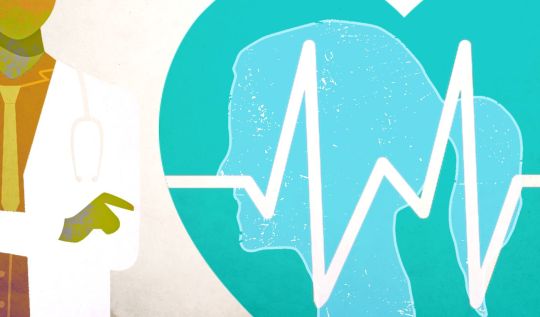
View On WordPress
#Bias rooted in emotion#discrimination#Female doctors leavng#Gender bias in medicine#health#Hysterical#Hysterical Neurosis#Impact on women huge#Medical Misogyny#medicine#Origins in ancient Egypt#Poorly analysed#real life disadvantages#Researcher Bias#sexually harassed#Women largely underrepresented#women practice medicine differently#women&039;s fertility
1 note
·
View note
Text
"you wouldn't be disabled if the world was built to accommodate mobility differences!" and here I thought it was being in pain + having a chronic illness that can cause just about every symptom!
#☢️.txt#i remember someone once actually saying that i#personally. im more concerned about doing the shit i WANT to be doing in the worls that does exist#i shouldnt be upset about my chronic fatigue and should instead accept it and be upset that im not allowed to rest#and they HAD chronic fatigue. like ok great glad you feel better simply by imagining a world where you can be ill without dying#bc im never gonna get to live in a society that supports chronically ill people. and because i actually do find my life miserable!#i like to do things! i have interests! i like school! i have hobbies and friends! why the fuck is saying that my chronic illness#is primarily a medical issue wrong! why the fuck does every disabled leftist stop talking about bodily autonomy#the SECOND its a disabled person expressing a desire for medical solutions.#anyways im pro medicine. i love medicine. i think allopathic medicine is a great human success and it would be an even greater one#if we properly tackle issues of race/gender/ability and bias. and i even think its good to look for ways#to improve peoples lives and health. and sometimes those things are going to involve treating disabled ppl with the goal of curing#and i am extremely glad people DO that bc its why im able to take a pill and not have chronic fatigue (hormone replacement for thyroid)#sorry for the rant i just genuinely hate how ppl act like their experience of disability means ppl cant hate their own
1 note
·
View note
Text
Girls in Education in Pakistan – Asrar Qureshi’s Blog Post #890

View On WordPress
#Asrar Qureshi#Blogpost890#Education#Gender Bias#Gender Gap#Gender Inequality#Girls Education#Harassment#Medical Education#Opportunities#Pharma Veterans#Professional Issues#Social Issues#Wastage
0 notes
Text
I’m going to be honest. I don’t think you should be a pharmacist or a doctor if you’re not comfortable dispensing medication and assisting people of every demographic. The medical field is one place where the right to refuse service gets people killed. If you’re not able to empathize and help people because of a personal bias against their race, sexuality, gender identity, disability status, religion etc., do not become a doctor. If your “personal beliefs” against birth control are so strong that you will refuse to dispense lifesaving medications like hormonal birth control or misoprostol or you’re so virulently transphobic that you refuse to dispense hormones and hormone blockers, you should not be a pharmacist.
If you have these beliefs that are so strongly against people’s bodies and identities, you should not work around vulnerable demographics. If you want a job where you have the right to pick and choose who you assist, go into gig work or something.
6K notes
·
View notes
Text
love when certain autistic spaces are full of posts about how autistic women are just fundamentally different from autistic men and stuff like hypercorrectness, infodumping, "weird" special interests, bluntness, aggressive meltdowns, low empathy, etc. is all male autism stuff and actually female autists are never like that no us autistic women are all experts at masking in fact we're so good at masking that nobody can tell we're austistic and we all come off as just cute and quirky and overly nice and friendly!! (especially when the post is clearly framing the "male autism" stuff as "cringe" and "gross" and "weird").
and when i say "love" i mean i hate it with a burning fiery passion.
autism is underdiagnosed in women. the medical system has a bias against women. all of this is true. but there is no such thing as "male autism" and "female autism." any autistic trait can present in any gender. autistic women are just people, and like any group of people, we come in all different personality types. same goes for autistic people of any gender.
also, bullying autistic people for being autistic doesn't magically become Not Ableist just because the target is a man.
5K notes
·
View notes
Text
One of my autism questionnaires:
"This questionnaire uses he/him pronouns to not make it longer unnecessarily" (okay, kinda ugh, but doesn't bother me personally)
... "bEcAuSe tHe mAjOriTy oF pEoPlE WiTh aSpErGeR's sYndRoMe ArE MaLe."
Just dafuq. Already lost some trust in their competence.
0 notes
Text
Erin Reed reports:
On Wednesday, Feb. 28, the American Psychological Association announced in a historic policy resolution that it opposes gender-affirming care bans for transgender youth. The association, the largest psychological organization in the world with 157,000 members, declared, “Government bans on gender-affirming care disregard the comprehensive body of psychological and medical research supporting the positive impact of gender-affirming treatments,” and resolves the organization’s support for the necessity of that care for transgender youth and adults.
The policy, which passed 153-9, is the strongest yet from the organization in support of gender-affirming care and represents a major consensus among leading psychologists on the importance of gender-affirming care for youth and adults.

The policy includes several findings and resolutions, such as:
Gender affirming medical care is medically necessary - “the APA underscores the necessity for access to comprehensive, gender-affirming healthcare for transgender, gender-diverse, and nonbinary children, adolescents, and adults”
The organization opposes bans on gender affirming care - “the APA opposes state bans on gender-affirming care, which are contrary to the principles of evidence-based healthcare, human rights, and social justice, and which should be reconsidered in favor of policies that prioritize the well-being and autonomy of transgender, gender-diverse, and nonbinary individuals”
Being trans is not “caused” by autism or post-traumatic stress - “legislative efforts to restrict access to care have involved the dissemination of misleading and unfounded narratives (e.g., mischaracterizing gender dysphoria as a manifestation of traumatic stress or neurodivergence, and equating affirming care for transgender, gender-diverse, and nonbinary youth with child abuse), creating a distorted perception of the psychological and medical support necessary for these youth and creating a hostile environment that adversely affects their mental health and wellbeing.”
False information on trans care needs to be combatted - “APA supports efforts to address and rectify the dissemination of false information to ensure the well-being and dignity of transgender, gender-diverse, and nonbinary individuals”
Discrimination, non-affirmation, and rejection risks suicide - “gender-based bias and mistreatment (e.g., discrimination, violence, non-affirmation, or rejection in response to gender diversity) pose significant harm, including risk of suicide, to the well-being of children, adolescents, adults, and families.”
More here!
1K notes
·
View notes
Text
#uk news#asian news#racial bias in medical devices#gender bias in medical devices#racial disparity in healthcare#gender disparity in healthcare
0 notes
Note
I've been scrolling through your blog, and I saw your post about discussing the racialized nature of gender. As someone who has several transmasc POC friends, and someone who's a nonbinary POC themself, I wanted to give my 2 cents.
It's important to understand that "woman" in the "man vs woman" gender binary is a colonialist, white supremacist construct, especially in Western countries where you are the numerical minority. My trans friends aren't on T, they haven't gotten top surgery, we are all quite young. But they all have numerous stories about being addressed as "sir" which brings them euphoria but as one person said, while we were making fun of the amount of white people in our club, "Due to my race and skin color, I get masculinized."
And again I'd like to emphasize, that since we're young, none of us really have medically transitioned due to financial and familial barriers. Their hair is long, our binders we definitely have notable chests, and even if they dress masculine, it's notable that no one in our communities would ever gender us properly. It's often white people calling them "sir." Again, I think this reflects how gender performances in mainstream queer communities are deeply White. Like, trans boys talk about having haircuts, but only one of my friends has that wavier, more manageable hair that will help them pass. When you've got curly/kinky hair, the standards are different. For a white person, what's the difference between a "girl" Afro and a boy "Afro"? White cis people have a harder time identifying us, and literally talk to any black girl, and they'll tell you about being mocked, dehumanized, and called "manly".
I don't have much else to say. These are just my personal experiences. But if you want to be an ally to POC in the queer community, this is why it's so fucking important to bring in colonialism/imperialism/white supremacy into discussions of queer liberation. My biggest gripe with ignorant white queers is when they ignore their white privilege, and act like "cishets" (AKA the patriarchal system regulating sexuality and gender) is the only enemy. Because cishet POC deal with plenty of shit with being infantilized, masculinized, feminized, seen as brutish & dangerous, the list goes on. Doberbutts had a post saying, "Believe me, your family's going to care more about me being black than my queerness." towards his white partners. Acknowledging and creating a framework that centers these intersections of queerness and race into your beliefs is true allyship. This is why if you're not anti-imperialist, anti-capitalist, ACAB...I do not think you care for queer liberation. None of us are free until all of us are free.
Please don't view this post as an attack. But this is my perspective, and I thought you'd be receptive to me sharing my lived experiences.
Oh I absolutely don't view this ask as an attack, and I really appreciate you bringing these things up because you're right! Like, just very plainly: You are right and your and your friends lived experiences are extremely important to the conversation on the racialized aspects of gender.
It gets me thinking about where Misogynoir and the social White Fear of Black manhood intersect for Black trans men in particular. Because Black women and Women of Color in general are masculinized by White gender standards and the ways in which Black trans masculine people are gendered in alignment with their identity is absolutely not always done with gender affirming intent. In fact, it's often actually done with racist intent or is fueled by racist bias when it's coming from White people or even from non-Black POC.
That's kind of restating things you've said but differently, it's just such a topic worth highlighting explicitly since it's extremely relevant to the conversation that's been happening about Male Privilege here the last few days.
I do think I know exactly what @doberbutts post you're talking about and yeah. It's just truth. It's something Black queer people have been talking about for ages in both theory and in pop culture (my mind immediately goes to Kevin Abstract and "American Boyfriend") where Black queer/trans identity is both materially different from (neutral) and is treated differently from (negative) White queer/trans identity in multitudes of ways and those differences are worth sharing and exploring and talking about.
Genuinely, thank you for sharing! I try really hard not to lead these kinds of conversations outside of explicitly referencing back to non-White theorists because I don't particularly feel like it's my place to do so, but I will always provide a platform for them because they're extremely important conversations to be had.
265 notes
·
View notes
Text
By: Leor Sapir
Published: Jan 22, 2024
Every time I recommend "The Myth of 'Reliable Research'" to medical professionals, they tell me it's a superb article, research at its finest.
They're not wrong.
The foundation for sex trait modification in minors ("gender-affirming care") is a Dutch study, published in two papers (2011 and 2014), and widely cited even today, even by transgender advocacy groups like WPATH, as the gold standard of research in this area.
"The Myth of 'Reliable Research'" provides a critical appraisal of the Dutch study. It explains the serious methodological problems that led health authorities abroad to find--in systematic evidence reviews--that this research is highly unreliable.
"Three methodological biases undermine the research: (1) subject selection assured that only the most successful cases were included in the results; (2) the finding that 'resolution of gender dysphoria' was due to the reversal of the questionnaire employed; (3) concomitant psychotherapy made it impossible to separate the effects of this intervention from those of hormones and surgery."
The article discusses how an "innovative clinical practice" (essentially, an experiment) "escaped the lab" and was quickly adopted in a number of Western countries as "settled science."
Though not discussed in the article, a key issue is why European health authorities have been better able to detect this problem of "runaway diffusion" and change course. As I've argued, the reasons have to do with a mixture of decentralization in American healthcare, complex private-public interactions, profit motives, professional incentives, and broader political polarization.
After reviewing the flaws of the Dutch study, "The Myth of 'Reliable Research'" goes on to discuss subsequent research and the problem of "spin," which is when researchers misrepresent their findings (often in the abstract, perhaps anticipating that lazy, ideologically-aligned, or subscription-less journalists will often not read past that paragraph, but sometimes in the study's conclusion).
The three examples of "spin" in research are:
* Carmichael et al. 2021: https://journals.plos.org/plosone/article?id=10.1371/journal.pone.0243894 (note that there was a follow-up to this study: https://www.tandfonline.com/doi/full/10.1080/0092623X.2023.2281986)
* Costa et al. 2015: https://onlinelibrary.wiley.com/doi/abs/10.1111/jsm.13034
* Tordoff et al. 2022: https://jamanetwork.com/journals/jamanetworkopen/fullarticle/2789423 (the authors rightly call the spin of this article "dramatic")
For more on how journalists promote bad science see here: https://unherd.com/2023/04/the-media-is-spreading-bad-trans-science/
Medical historians and others who write about how Western societies got embroiled in one of the biggest medical scandals in modern history will undoubtedly cite "The Myth of 'Reliable Research'" as an important moment in the scientific debate, a moment when it was no longer possible for clinician-advocates to insist that the "science is settled" and that anyone who is skeptical is motivated by prejudice or ignorance.
And the proof is in the pudding. Pro-medicalization activists, including clinicians, now admit that the quality of evidence--which in EBM means the confidence we can have in the estimate of effect of some intervention--is "very low." They insist, however, that many other pediatric interventions are also based on low quality evidence.
The pivot is unsuccessful for reasons I can't get into here. There are exceptional circumstances where EBM allows for recommendations for treatment based on low-quality evidence, and this is not one of them.
But let's not lose sight of the concession here, which is that "gender-affirming care" is an ongoing medical experiment, and two decades of research have failed to produce reliable findings that these risky and harmful interventions are "medically necessary."
If you follow the gender medicine debate and haven't read "The Myth of 'Reliable Research,'" consider it a massive gap in your knowledge.
Here is the open-access article: https://www.tandfonline.com/doi/full/10.1080/0092623X.2022.2150346
For precision: "innovative clinical practice" is not technically an experiment; in general, experiments--ideally, RCTs--are needed to figure out whether, when, and on whom ICPs are beneficial. But in the Dutch case, the ICP was launched more or less in the context of a (very poorly done) experiment.
[ Archived: https://archive.md/CAsIP ]
#Leor Sapir#medical experimentation#gender affirming care#sex trait modification#gender affirming healthcare#gender affirmation#methodological bias#gender ideology#queer theory#evidence based medicine#the science is settled#low quality evidence#medical scandal#medical mutilation#medical malpractice#medical corruption#religion is a mental illness
1 note
·
View note
Note
So, I'm writing an essay on the whole STATE of misogyny in WC for one of my university classes, and I was wondering if I could ask you a couple of things! No pressure of course, please feel free to say no!
A) Could I reference your good takes with appropriate harvard referencing and links back to your blog?
B) Are there any specific moments from the books that you think should be covered the most?
C) The end result will be a visual essay, so it's like those fun infographics people on Tumblr make on like ADHD and stuff, so when it's done, would you like to be tagged to read it?
(Sorry for anon, I'm nervous lmao, but if you'd be more comfortable I'll resend this off anon)
AAY good topic! You've got a lot to work with. Absolutely feel free to reference anything I've written, and tag me when you're done.
While you're here and about to write something so legitimate, I'm also going to recommend you check out Sunnyfall's video on gender in Warrior Cats. She breaks down the arcs into numbers, directly comparing the amount of lines mollies have to toms, and examining the archetypes women are usually allowed to be.
I think it's a must-have citation in a paper about WC misogyny.
...and, I think it's insightful to look at the WCRP Forum thread about the video. Note how the respondents immediately come into the thread to complain about how the video is too long so they didn't watch it, dismissing Sunnyfall as not being entertaining enough to hold their attention, even whining that she starts with statistics to prove her point, which I'm convinced she did exactly because they would have cried that she "had no evidence" if she didn't.
I am not a scholar, so I don't know how to document or prove that the books have an impact on the audience outside of anecdotes. But I think if you do write a section about fandom, it would be worth mentioning the in-universe and metatextual apologia for Ashfur and its reflection in the real world discourse, the authorial killing of Ferncloud because of fan complains, and the utter defensiveness against the discussion of misogyny you see outside of Tumblr.
You may also want to check out Cheek by Jowl, a collection of 8 essays about sexism in xenofiction by Ursula K. Le Guin. There's a very unique manifestation of authorial bias in animal fiction, having a lot to do with how the author views "the natural world," and it's worth understanding even though Warrior Cats are so heavily anthropomorphized.
So... Warrior Cats Misogyny
I think discussing individual instances can be helpful, but I'd implore you to keep in mind what's REALLY bad about WC's misogyny is framing and the bigger picture.
Bumble's death is shocking and insulting, but it's not just that she died. It's that the POV Gray Wing sees her as a fat, useless bitch who took his mate so she deserves to be dragged back to a domestic abuser, and he's right because the writers love him so much. It's that Bumble's torture and killing only factors into how it's going to hurt a man's reputation.
It's how Clear Sky hitting, emotionally manipulating, or killing the following women,
Bright Stream (pressured into leaving her home and family)
Storm (controlled her movements and yelled at her in public)
Misty (killed for land, children stolen)
Bumble (beaten unconscious, blamed nonsensically on a fox)
Alder (child abuse, hit when she refused to attack her brother)
Falling Feather (scratched on the face, subjected to public abuse and humiliation)
Tall Shadow (thrown into murderous crowd, attacked on-sight in heaven)
Rainswept Flower ("blacked out" in anger and murdered in cold blood)
Moth Flight (scratched on the face for saying denying medical treatment is mean, taken hostage in retaliation against mother for the death of his own child, which he caused)
Willow Tail (eyes gouged out for "stirring up trouble")
Is seen as totally understandable, forgivable, or not even questioned at all, when killing Gray Wing in an act of rage would have been "one step too far" with the ridiculous Star Line.
"Kill me and live with the memory, and then let the stars know it would only matter if a single one of your murder victims was a man."
It's the way that fathers who physically abuse their kids out of their ego (Clear Sky, Sandgorse, Crowfeather) aren't treated anywhere near the same level of narrative disgust and revulsion the series has for "bad moms", even if they're displaying symptoms of a post-partum mood disorder (depression, anxiety, and rage), an umbrella of mental illnesses 20% of all new mothers experience but are heavily stigmatized with (Sparkpelt, Palebird, Lizardstripe).
It's Crookedstar's Promise giving him two evil maternal figures in a single book, while bending over backwards to make every man in a position of power still look likeable in spite of the fact they're enabling Rainflower's abuse. Leader Hailstar is soso sorry that he has to change Stormkit's name for some reason, in spite of leaders being unaccountable dictators the other 99% of the time, and Deputy Shellheart functionally does nothing to stop his own son from being abused or even do much parenting before or after the fact.
It's the way men's parental struggles are seen sympathetically, and they don't have to "pay for it" like their female counterparts (Crookedstar's PPD vs Sparkpelt's PPD, how Daisy and Cinders are held responsible for Smoky and Whisper being deadbeats, Yellowfang's endless guilt for killing her son vs Onestar's purpose in life to kill his own), even to the point where a father doesn't have to have raised their kids at all to have a magical innate emotional connection to them (Tree's father Root, Tom the Wifebeater, Tigerstar and Hawkfrost).
It's less speaking lines and agency for female characters, being reduced to accessories in the lives of their mates and babies, women getting less diversity in their personalities, with even major ex-POV characters eventually becoming "sweet mom" tropes.
You could zoom in on any one of these examples and have an amoeba try to argue with you that "Oh THIS makes sense because X" or "Ah well my headcanon perfectly explains this thing" or "MY mother/girlfriend was abusive/toxic/neglectful and I've decided that you are personally attacking ME by having issues with how a character was written or utilized," but the beleaguered point,
That I keep trying to hammer in, over and over, across books worth of posts,
Is that these are trends. More than just a couple one-off examples. It's the fabric that has been woven over years, showing a lack of interest in, or even active prejudice of, women on behalf of the writers.
LONG STANDING trends, which have only gotten worse as the series progressed. From Yellowfang being harshly punished with a born evil son who ruins her life in TPB and the mistreatment of Squirrelpaw that begins in TNP, all the way up to the 7 Fridgenings of DOTC and Sparkpelt's PPD being a major character motivator for her son Nightheart.
So, I would stress that in your paper, and structure it less as "the Sparkpelt slide" and "the Yellowfang slide," and more as "The paternal vs maternal abuse" slide, and "the violence against women" slide. They're really big issues, there's tons of examples for each individual thing.
Anyway to leave off on a funny, look at this scene in Darkest Hour that I find unreasonably hilarious,
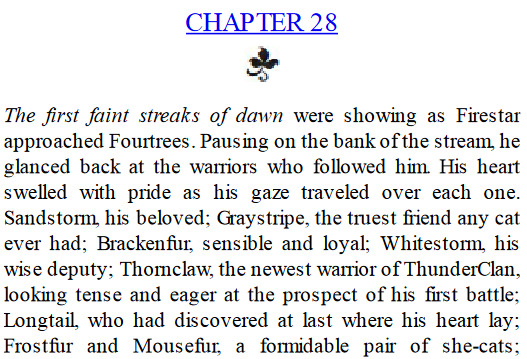
"Everyone who matters to me; my truest friend, my sensible and loyal warrior, the wisest deputy I've ever known, and 2 women." -Firestar, glorious idiot
He can't even think of a single trait for either of them what the hell does "formidable pair" mean lmaooo, when I finished a reread about a year ago this line killed me on impact.
#bone babble#cw misogyny#warrior cats analysis#SO good luck!! Absolutely ping me when you're done I wanna see lmao#Full disclosure I'm bad at responding to DMs because I open them and then forget#But I can try to answer your questions#Feel free to send questions in tho. You don't have to come off anon if you don't want i don't mind#I cannot stress enough. I'm just a guy who likes to yell about cats.
244 notes
·
View notes